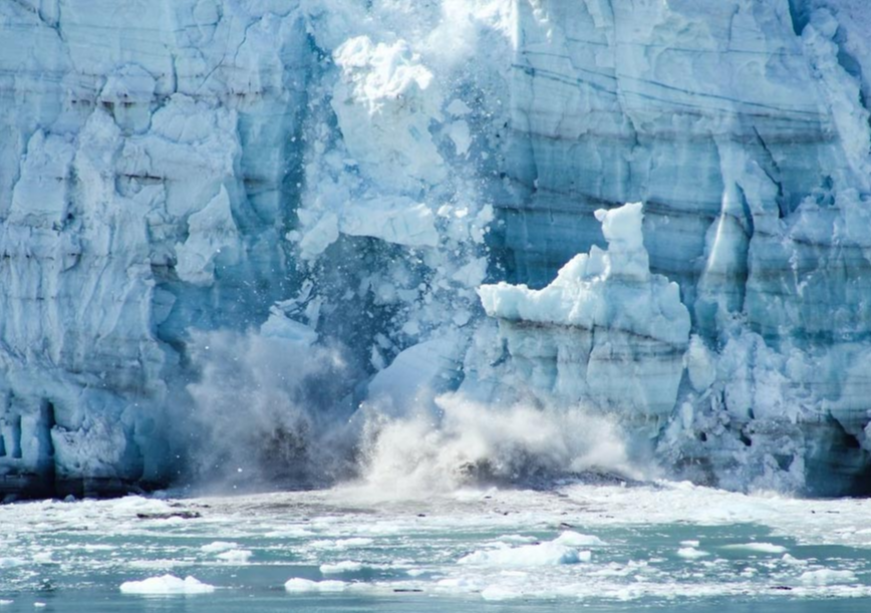-
CENTRES
Progammes & Centres
Location
While resource exploitation in the Artic may offer short-term gains, the long-term consequences for the planet outweigh them

The Arctic region is rapidly becoming a focal point of global geopolitics, propelled by the melting of sea ice due to climate change, which presents both opportunities and challenges. As the Arctic ice recedes, previously inaccessible resources such as oil, gas, and minerals become available, tempting major powers like the United States (US) and Russia, to exploit them. However, this exploitation comes at a cost—accelerated climate change due to increased greenhouse gas emissions. The long-term consequences of losing the protection offered by the Arctic sea ice would mean that the Earth would experience catastrophic global warming.
Rationality dictates that for the global commons to survive, all states should converge towards collective action for the long-term preservation of the Arctic.
Analysing the dynamic of the Arctic from a strategic decision-making perspective underscores the imperative of maintaining the balance between cooperative efforts to safeguard the Arctic from the impacts of climate change and the individual pursuit of new resource opportunities arising from the melting sea ice. Rationality dictates that for the global commons to survive, all states should converge towards collective action for the long-term preservation of the Arctic.
To understand the dynamic, we must identify the key Arctic players. Firstly, there are the members of the Arctic Council—the primary intergovernmental forum on the Arctic, consisting of the US, Russia, Norway, Finland, Sweden, Denmark, Canada, and Iceland. Then, there are the emerging Arctic states—members of the Global South who have taken an increased interest in Arctic policy. These are China, which is interested in gaining access to the Arctic’s resources and has declared itself to be a “near-Arctic” state, and India, which is concerned about the scientifically-established connection between the loss of the Arctic sea ice and the increasing instability of India’s monsoons.
Currently, much of the Arctic Council’s work has been suspended as a result of the Western boycott of Russia due to its invasion of Ukraine. This divide is further exacerbated by the accession of Sweden and Finland to NATO, creating a “West and the rest” dynamic at the Arctic Council. All Arctic Council members have a rational interest in avoiding a further escalation of Arctic tensions to avoid spillover from the Ukraine conflict.
Militarising an already volatile region, which in turn accelerates the loss of sea ice, will compromise Russia’s ability to conduct the war in Ukraine, given it is already under pressure to break the grinding stalemate.
For Russia, pouring troops and resources into accessing Arctic bases and minerals creates a new flank that needs to be defended against NATO. Militarising an already volatile region, which in turn accelerates the loss of sea ice, will compromise Russia’s ability to conduct the war in Ukraine, given it is already under pressure to break the grinding stalemate. Russia also lacks the capacity to access the Arctic’s resources by itself, having been forced to turn to China and India for assistance in obtaining icebreakers to open shipping lanes in the Northern Sea Route. Creating a scramble for resources in the Arctic will, therefore, place Russia at a competitive disadvantage to its Arctic peers who are not facing extensive trade sanctions and can acquire Arctic equipment without problems. On the other hand, working to protect the Arctic, even in a limited capacity, restores some of Russia’s legitimacy on the world stage. While it cannot offset continued aggression in Ukraine, it would provide a rational foundation for Russia to be seen once again as a partner in Arctic governance.
For the remaining Arctic states, cooperation on Arctic climate protection diffuses tension in the region caused by the Ukraine war, which mitigates the current lack of defence capacity the US and NATO has in the Arctic. Cooperation also opens up new opportunities to work with emerging Arctic states like India, through the development of new initiatives on Arctic science. This is seen as strengthening the West’s connection to India and towards opening new avenues for partnership to help counter Chinese influence. More selfishly, the loss of Arctic permafrost due to climate change caused by human activity will release vast amounts of greenhouse gas emissions into the atmosphere. This would force the Global North to escalate its reduction in greenhouse gas emissions, as well as require further compensation to the Global South for loss and damage caused by the worsening impact of climate change. Protecting the Arctic slows down the rate at which the Western members of the Arctic Council would need to make the necessary cuts in emissions, buying them more time to phase out fossil fuels. There may be some concerns about cooperating with Russia even in a limited scientific capacity. However, the cooperation between the US and Russia during the Cold War on space science in the 1970s shows that there is precedent for big powers coming together in the common interest of humanity even amidst a wider context of divided geopolitics. This scientific cooperation was crucial to the later development of the International Space Station. The same form of cooperation today would be in the self-interest of Western Arctic states who can expand their Arctic scientific capacities while retaining their wider detachment from Russia.
Protecting the Arctic slows down the rate at which the Western members of the Arctic Council would need to make the necessary cuts in emissions, buying them more time to phase out fossil fuels.
We must also consider the possibilities from the perspective of emerging Arctic states such as China and India. For China, accessing resources in the Arctic as part of its “Polar Silk Road” initiative will increase existing tensions within the West regarding the disproportionate influence China is exerting on the global economy. On the other hand, working with current Arctic states would demonstrate China to be a credible leader in climate mitigation, without it having a major impact on China's economy. China can also strengthen and enhance its research capabilities in the Arctic by cooperating with Arctic states on science, which can open new sustainable opportunities for it within Arctic governance and policy. Arctic cooperation would therefore enhance China’s claim to be a “near-Arctic” state.
For India, the rational interest in Arctic climate protection is even more clear-cut. Working with Arctic states on Arctic climate measures bolsters India’s claim as the leader of the Global South, while also granting it a new role in Arctic governance. More directly, it prevents further damage to the monsoons from the teleconnection to the loss of sea ice. The stability of the monsoons is critical to preserving India’s agricultural sector, which ensures that it stays on track to become the third-largest economy in the world by 2030. India also has first-class expertise in Arctic science and technology, having recently launched its first Arctic winter expedition in 2023. Using this expertise in climate research and monitoring would further strengthen India’s role in the Arctic.
Working with Arctic states on Arctic climate measures bolsters India’s claim as the leader of the Global South, while also granting it a new role in Arctic governance.
Ultimately, the outcome hinges on collective action to preserve the Arctic sea ice. While resource exploitation may offer short-term gains, the long-term consequences for the planet and each state's rational self-interest outweigh them. Therefore, prioritizing science-led cooperation to monitor and protect Arctic sea ice is paramount for ensuring a sustainable future for the region and the planet as a whole.
In conclusion, Arctic geopolitics necessitates collective climate action. A unified approach to climate protection can enable Arctic stakeholders to navigate these complexities and secure a sustainable future for the region and the planet.
Zerin Osho is the Director of the IGSD India Program, focusing on fast mitigation strategies and sustainable development in climate-vulnerable states.
Eoin Jackson is a PhD candidate at the London School of Economics and a former Legal Fellow at IGSD.
The views expressed above belong to the author(s). ORF research and analyses now available on Telegram! Click here to access our curated content — blogs, longforms and interviews.

Zerin Osho is the Director of IGSD India Program, focusing on fast mitigation strategies and sustainable development in climate-vulnerable states. With over a decade at ...
Read More +
Eoin Jackson is an incoming PHD candidate at the London School of Economics and a former Legal Fellow at IGSD. He is the Irish Rapporteur ...
Read More +